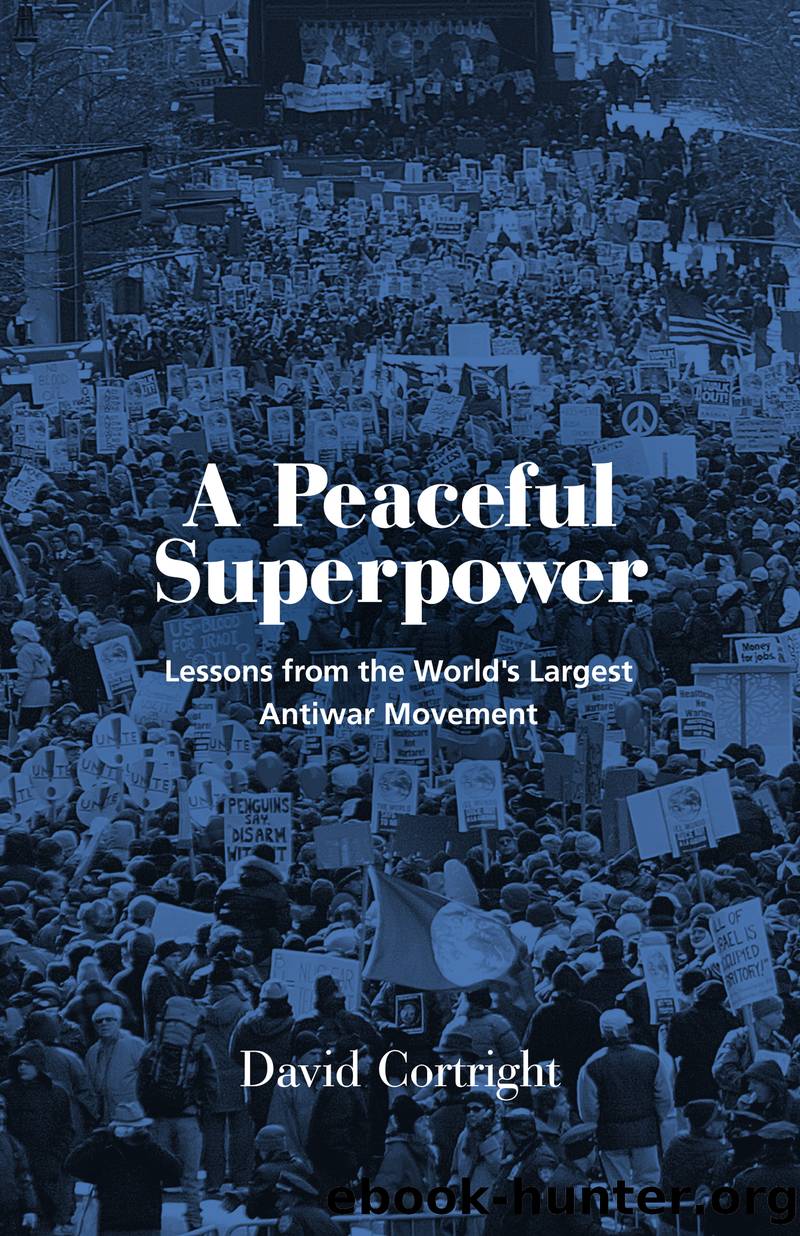A Peaceful Superpower by David Cortright;

Author:David Cortright;
Language: eng
Format: epub
Publisher: New York University Press
Resisters
Unlike GIs of the Vietnam era, soldiers opposed to the wars in Iraq and Afghanistan did not publish underground newspapers. They expressed their grievances in blogs and emails. In 2004, Garett Reppenhagen, an army sniper in Iraq, helped to start the Fight to Survive blog. It was described as âthe mouthpiece for a group of soldiers who are fighting in a war they oppose for a president they didnât elect while the petrochemical complex turns the blood of their fallen comrades into oil.â Reppenhagenâs friend, Jeff Engelhardt, wrote from Baquba: âThe best way to counter terrorism is not to participate in it. War is not the solution, and until we realize this, no one is safe.â19 Reppenhagen later became executive director of Veterans For Peace.
One of the first public resisters to the war was Camilo MejÃa, who later wrote a compelling memoir of his experience, The Road from ar Ramadi. A combat infantry leader in Ramadi during the early months of the war, MejÃa refused to return to Iraq after going home on leave and was subsequently court-martialed and sent to prison. MejÃa was the son of prominent Sandinista revolutionaries in Nicaragua, but he and his mother lived on limited means as immigrants in Florida in the 1990s. To earn income and get college tuition benefits he enlisted in the Army National Guard. He was nearing the end of his contract and preparing to graduate from college in 2003 when the mobilization for war began. He was called up for active duty and deployed to Iraq, and then his enlistment was extended indefinitely, a policy the military termed âstop loss,â and troops referred to as a âbackdoor draft.â He opposed the war but felt he had to go as ordered.
In his memoir MejÃa recounts both the mundane and the terrifying details of life as an infantry squad leader in the early stages of battling the insurgency. He describes the killing of civilians that he witnessed and in which he participated, and the corrosive effects such incidents had on his conscience as he struggled to justify his actions. The line between right and wrong âstarts to vanish in a heavy fog,â he wrote, âuntil it disappears completely and decisions are weighed on a scale of values that is profoundly corrupt.â20 As he sought a way out of his dilemma, he agonized about whether to resistâweighing the shame at serving in an unjust war against the guilt of abandoning the soldiers he led in combat. His odyssey of self-reflection led him to become a pacifist, opposing not only the Iraq war but war in general.
During his nine months in prison, MejÃa had time to think more deeply about the motivations that led him to refuse to return to the war. It was not the fear of dying, he wrote, but âthe fear of putting myself in a position where to survive means to kill. There was the fear of losing my soul in the process of saving my body, the fear of being lost to my daughter, to the people who love me.
Download
This site does not store any files on its server. We only index and link to content provided by other sites. Please contact the content providers to delete copyright contents if any and email us, we'll remove relevant links or contents immediately.
Nudge - Improving Decisions about Health, Wealth, and Happiness by Thaler Sunstein(7261)
iGen by Jean M. Twenge(5166)
The Fire Next Time by James Baldwin(5025)
Adulting by Kelly Williams Brown(4240)
The Hacking of the American Mind by Robert H. Lustig(4093)
The Sports Rules Book by Human Kinetics(4081)
The Ethical Slut by Janet W. Hardy(4042)
Captivate by Vanessa Van Edwards(3732)
Mummy Knew by Lisa James(3523)
In a Sunburned Country by Bill Bryson(3376)
The Worm at the Core by Sheldon Solomon(3328)
Ants Among Elephants by Sujatha Gidla(3282)
Suicide: A Study in Sociology by Emile Durkheim(2908)
The Slow Fix: Solve Problems, Work Smarter, and Live Better In a World Addicted to Speed by Carl Honore(2843)
The 48 laws of power by Robert Greene & Joost Elffers(2818)
Humans of New York by Brandon Stanton(2694)
Handbook of Forensic Sociology and Psychology by Stephen J. Morewitz & Mark L. Goldstein(2606)
The Happy Hooker by Xaviera Hollander(2586)
The Tipping Point by Malcolm Gladwell(2565)
